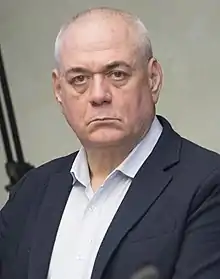Sergey Dorenko
Sergey Leonidovich Dorenko (Russian: Серге́й Леони́дович Доре́нко; 18 October 1959 – 9 May 2019)[1] was a Russian TV and radio journalist, known for hosting a weekly news commentary program in 1999–2000.
Sergey Dorenko | |
|---|---|
Russian: Серге́й Леони́дович Доре́нко | |
 Sregey Dorenko in 2017 | |
| Born | Sergey Leonidovich Dorenko 18 October 1959 |
| Died | 9 May 2019 (aged 59) Moscow, Russia |
| Occupation | Journalist, news presenter, opinion journalism |
| Website | dorenko |
Biography
In 1982 Dorenko graduated from People's Friendship University of Russia in Moscow, and served as a Portuguese-Russian translator in Angola. In June 1984 he was drafted to the military, but was discharged in January 1985 due to health problems.
In April 1985 Dorenko became an employee of Gosteleradio (State Television and Radio Broadcasting Company, the only TV and radio broadcaster in the Soviet Union).
Between 1996 and 1999 he hosted Vremya, a news commentary program on ORT. In September 1999 Dorenko hosted the weekly Sergey Dorenko Show on Saturdays at 9pm, and in November 1999 became a Deputy Director General of ORT. He was critical of the Mayor of Moscow, Yuriy Luzhkov, Yevgeny Primakov and their party Fatherland-All Russia, who were major opponents of Vladimir Putin and the pro-Putin party Unity during the 1999 State Duma electoral campaign.[2][3][4] In his program collages of Luzhkov in women's dress were shown.
In August 2000, Dorenko's program criticized the government handling of the submarine Kursk explosion. Soon afterwards, his program was cancelled, and Dorenko alleged that this was a result of pressure from the Kremlin. According to BBC News, Dorenko told Echo of Moscow radio at the time that "on 29th August the president proposed that I join his team, as he put it, and stay at Channel 1 to be his favourite and best-loved journalist."
"I said to him: I am very sorry, I can and very much would like to work at Channel 1 but as part of the team of the viewers. [President Putin] just said in reply: I see that you have not yet made up your mind. I said: On the contrary, I have made up my mind, in favour of the viewers."[5]
The director of Network ORT, Konstantin Ernst, insisted that contrary to Dorenko's allegations, the government had not been involved in the change, and that he made the decision to cancel the show because Dorenko had refused to stop discussing the government's plan to nationalize media magnate Boris Berezovsky's 49% stake in the network.[6][7][8] Following this incident, Dorenko became a vocal critic of Vladimir Putin's rule and did not work again for Russian television. Instead, he hosted radio programs for Echo of Moscow.[9]
On 30 September 2003, in Stavropol Krai, Dorenko joined the Communist Party of the Russian Federation. Two years later, Dorenko published 2008,[10] a work of political fiction about an upcoming revolution in Russia, featuring President Vladimir Putin and Igor Sechin, his close ally.
On 23 May 2007, Sergey Dorenko provided The Associated Press and The Wall Street Journal with the full video tape of an interview he recorded in April 1998 with Alexander Litvinenko and fellow FSB employees, where the agents appeared to confess that their bosses had ordered them to kill, kidnap or frame prominent Russian politicians and businesspeople, and thus made it publicly available in full for the first time. Only some excerpts of the video had been shown in 1998.[11][12]
From 2008 to 2013, he was editor-in-chief of the Russian News Service radio station.[13]
Since 2014, Sergey Dorenko was the founder and chief editor of the Govorit Moskva radio station.[14]
Health issues and death
On 9 May 2019, Dorenko was riding his Triumph Bonneville motorcycle[15] in the center of Moscow when he began veering into oncoming traffic, reportedly after suffering a cardiac event. Dorenko avoided collision with other vehicles, but struck the concrete guard rail on the opposite side of the highway. Dorenko was hospitalized, with doctors attempting to revive him for over an hour. Having never regained consciousness he was pronounced dead. Subsequent reports identified aortic rupture as the cause of Dorenko's death.[16] It was reported that Dorenko had been aware of his diagnosis since 2016 and his untimely death could have been avoided with proper treatment and medical care.[17]
References
- Умер журналист Сергей Доренко
- "Archived copy". Archived from the original on 30 October 2013. Retrieved 25 August 2017.CS1 maint: archived copy as title (link)
- "Putin's Media War - Committee to Protect Journalists". Cpj.org. Retrieved 7 November 2017.
- "Фонд Общественное Мнение / ФОМ". Bd.english.fom.ru. Archived from the original on 27 September 2007. Retrieved 7 November 2017.
- "BBC News - MEDIA REPORTS - Row erupts as Russian TV show axed". News.bbc.co.uk. Retrieved 7 November 2017.
- "Attacks on the Press 2000: Russia - Committee to Protect Journalists". Cpj.org. Retrieved 7 November 2017.
- "Publications details". Jamestown.org. Archived from the original on 17 October 2006. Retrieved 7 November 2017.
- "The Moscow Times — News, Business, Culture & Events". Sptimes.ru. Retrieved 7 November 2017.
- ""Курск" 15 лет спустя. Что думают дети погибших моряков о Путине, России и армии". Tvrain.ru. Retrieved 7 November 2017.
- "Сергей Доренко – скачать все книги бесплатно в fb2, epub, pdf, txt и без регистрации или читать онлайн на Fictionbook". Fictionbook.ru. Retrieved 7 November 2017.
- 1998 Tape Shows Russian Ex-Spy Fearful by Jim Heintz, The Associated Press, 23 May 2007.
- "Доренко ушел от "донецких" к украинскому коммунисту Симоненко". Novosti.dn.ua. Retrieved 7 November 2017.
- Врачи после вскрытия определили причину смерти Доренко. РБК, 10 May 2019.
- Погиб журналист Сергей Доренко. Ведомости, 9 May 2019.
- Мария Немцева (10 May 2019). ""Я на "Триумфе", чтоб не быть на "Харлее": мотоциклы в жизни Сергея Доренко". dailystorm.ru (in Russian). Retrieved 14 May 2019.
- Врачи назвали причину смерти Сергея Доренко, 10 May 2019.
- Смерть Доренко была предотвратима: врачи изучили историю болезни журналиста
External links
- Official website (in Russian)